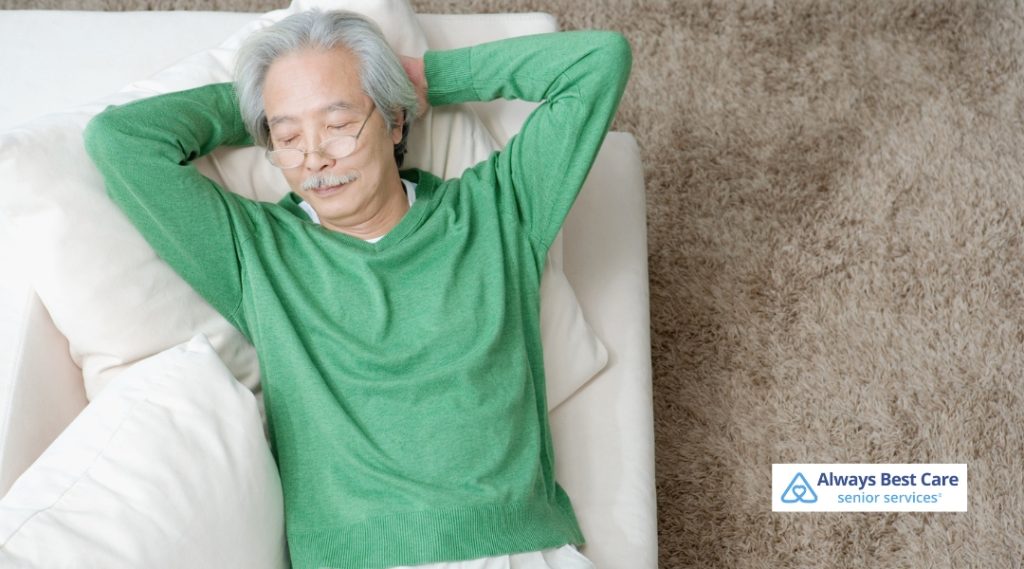Seniors Say Goodbye to Sleepless Nights: 6 Strategies for Better Rest in Cypress, TX

In Cypress, many seniors find that restful sleep doesn’t come as easily as it once did. But the good news is, better rest is within reach.
Our team explores six simple yet effective strategies that can help seniors in Cypress improve their sleep and wake up feeling more refreshed and energized.
From calming evening routines to smart lifestyle changes, these practical tips are designed to restore the comfort, safety, and serenity that make good sleep possible, night after night.
Table of Contents
Why Sleep Becomes More Elusive with Age
As we age, it’s natural for sleep patterns to change, but for many seniors, these shifts can lead to restless nights and groggy mornings. One common reason is a decrease in the body’s melatonin production, which regulates our sleep-wake cycle.
Medical conditions also play a significant role. Chronic pain, arthritis, heart disease, and neurological conditions like Alzheimer’s can all disrupt rest.
Frequent trips to the bathroom during the night—a result of age-related bladder changes or medications—can also fragment sleep, making it harder to get the deep, restorative rest the body needs. Drugs commonly used to manage blood pressure, mood, or pain can also interfere with sleep quality, either by causing drowsiness during the day or restlessness at night.

1. Set a Steady Sleep Routine
One of the most powerful ways to improve sleep in later life is by sticking to a consistent routine. Going to bed and waking up at the same time each day—even on weekends—helps reinforce your body’s natural sleep-wake rhythm. Over time, this trains your internal clock to expect rest at the right hours.
Incorporating a calming pre-bed ritual, like reading a book, listening to soft music, or practicing deep breathing, signals to your body that it’s time to wind down. Avoid stimulating activities before bed, such as watching intense TV shows or scrolling through devices, as the blue light and mental stimulation can delay sleep onset.
2. Make Your Bedroom a Sleep Sanctuary
Your sleep environment plays a big role in how well you rest. A cool, dark, and quiet room encourages deeper, more restorative sleep. Use blackout curtains to block out streetlights, and consider a white noise machine or fan to mask disruptive sounds.
Your mattress and pillows should support your body comfortably, especially if you deal with joint pain or stiffness. Keep the bedroom reserved for rest, avoiding work, eating, or screen time in bed so your mind associates the space with sleep.

3. Adjust What—and When—You Eat and Drink
What you consume in the hours leading up to bedtime can either support or sabotage your sleep. Caffeine and alcohol, for instance, can interfere with your ability to fall and stay asleep, even if consumed earlier in the day.
Heavy or spicy meals close to bedtime can cause indigestion and disrupt rest, so opt for a light snack if you’re a little hungry. A banana, a small bowl of oatmeal, or a few almonds can promote sleep without making you feel too full. Also, limit fluid intake in the evening to reduce nighttime trips to the bathroom.
4. Get Moving for a Better Night’s Sleep
Regular physical activity can significantly improve sleep quality, especially for older adults. Gentle exercises like walking, stretching, or swimming help regulate your body’s internal clock, reduce daytime fatigue, and ease stress, all of which contribute to better sleep.
Aim for at least 30 minutes of movement most days, but try to finish workouts a few hours before bedtime. Exercising too late in the day can leave you feeling too energized to settle down at night. Light activity can make a difference, so listen to your body and stay consistent.

5. Soothe Your Mind and Body Before Bed
Unwinding mentally and physically before bedtime can help prepare you for restful sleep. Stress and racing thoughts are common causes of insomnia, so it’s important to find a relaxation routine that works for you.
Gentle yoga stretches, calming music, a warm bath, or deep breathing exercises can lower your heart rate and signal to your nervous system that it’s time to rest. Some seniors also benefit from guided meditation apps or journaling at night to ease worries and promote peace of mind.
6. Review Your Medications With a Healthcare Provider
Many seniors take multiple medications, some of which may interfere with sleep. Diuretics, certain blood pressure medications, antidepressants, or pain relievers can all have side effects that disrupt rest—whether by causing drowsiness at the wrong time of day, increasing nighttime awakenings, or affecting REM sleep.
Schedule a medication review with your doctor or pharmacist if you’re having trouble sleeping. They can help identify possible culprits and explore alternative options or dosing schedules that better support your sleep health without compromising your overall treatment plan.

How In-Home Care Promotes Better Sleep
For many seniors, the key to a better night’s sleep lies in having the right support system in place. In-home care offers more than just assistance—it provides peace of mind, consistency, and comfort. When routines are maintained and stress is reduced, the body and mind are more likely to relax and prepare for quality rest.
Professional caregivers can assist with everything from winding down in the evening to managing medications and encouraging healthy habits. Their presence offers a reassuring sense of security, especially for those who live alone or struggle with nighttime anxiety.
Having a caregiver means having someone who understands the importance of routine. Caregivers can create a reliable nightly structure that promotes better sleep, from evening hygiene and preparing a light bedtime snack to helping with mobility or medication reminders.
Companionship also plays a vital role. Simply having someone to talk to in the evening or help ease nighttime fears can significantly reduce stress and feelings of isolation that often contribute to insomnia.
Reduce Nighttime Stress with Reliable Care from Always Best Care of Cypress!
At Always Best Care of Cypress, we understand the challenges that come with aging, including sleep difficulties. Our compassionate caregivers can help establish a calming nighttime routine, assist with daily activities, and provide companionship to reduce stress and promote relaxation.
If you or a loved one is struggling with insomnia and needs extra support, we are here to help. Contact Always Best Care of Cypress at (281) 246-0080 to schedule a care consultation and learn how our in-home care services can improve your quality of life. A restful night’s sleep is just a call away.





